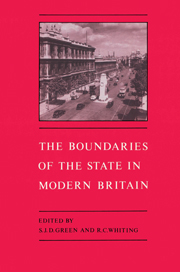Book contents
- Frontmatter
- Contents
- List of figures
- List of tables
- List of contributors
- Acknowledgements
- 1 Introduction: the shifting boundaries of the state in modern Britain
- Part I The state and political theory
- Part II The economy
- Part III Welfare and social policy
- Part IV Conflict and order
- 12 British national identity and the First World War
- 13 A state of seige? The state and political violence
- Part V Religion and morality
- Index
12 - British national identity and the First World War
Published online by Cambridge University Press: 18 March 2010
- Frontmatter
- Contents
- List of figures
- List of tables
- List of contributors
- Acknowledgements
- 1 Introduction: the shifting boundaries of the state in modern Britain
- Part I The state and political theory
- Part II The economy
- Part III Welfare and social policy
- Part IV Conflict and order
- 12 British national identity and the First World War
- 13 A state of seige? The state and political violence
- Part V Religion and morality
- Index
Summary
There has been in recent years a burst of interest among historians in the nature and evolution of British national identity. Among labour historians, this tendency is an indication of the decline of the Labour Party, consigned to the political wilderness in the Thatcher years and after by a failure to present Labour policies as ‘national’ rather than class-based. Why conservatism is national and socialism sectarian is a current political question with a long historical past. Both are class-based ideologies, but conservatism in the 1980s (as in the 1930s) more successfully pressed its claim to speak for the ‘nation’. In addition, this literature has reflected a wider debate within Britain over political integration within the European community, and the rearguard action among some Conservative and Labour politicians against it. And the recrudescence of strident patriotic voices, during both the Falklands War and the Gulf War, despite the fact that the British way of life was by no means threatened by either Galtieri or Saddam Hussein, again raised the issue of precisely what British troops who risked their lives were actually defending.
Historians have approached the problem of what has constituted Britishness from many different directions. Some have explored the earlier history of the British ‘patriot’, defined as ‘one who defends constitutional rights, reveres liberty, agitates for an end to corruption, and struggles with the outrages of centralized power’. Nationalism has never been identical with this kind of patriotism, and historians have shown how on occasion the two have been diametrically opposed.
- Type
- Chapter
- Information
- The Boundaries of the State in Modern Britain , pp. 261 - 277Publisher: Cambridge University PressPrint publication year: 1996
- 2
- Cited by



